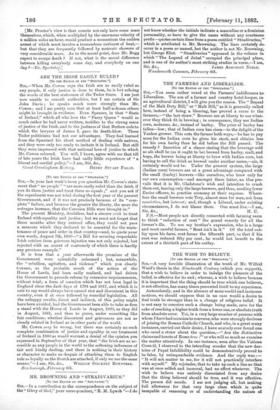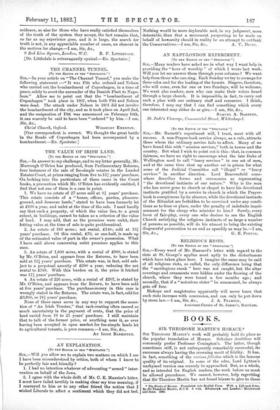THE WISH TO BELIEVE.
[To THE EDITOR OF TEE " SPEOTATOR."]
Sta,—A very forcible illustration of the truth of Mr. Wilfrid' Ward's thesis in the Nineteenth Century (which you support), that a. wish to believe in order to indulge the pleasure of the belief, is effective for its end; whereas, a wish to believe because it is important that the thing should be true which one believes,. is not effective, has many times presented itself to my experience.
Antecedently, and in the absence of more sordid and insincere motives, we should suppose that in no case would a desire to find truth be stronger than in a change of religions belief. Ib- is not easy to conceive such a change being made, save for the sake of reaching a higher truth from a lower one, or absolute truth from absolute error. Yet, in a very large number of persons with whom I have had occasion to converse, who were strongly desirous of joining the Roman Catholic Church, and who, in a great many instances, carried out their desire, I have scarcely ever found one: who cared a straw about the question,—" Are the distinctive- claims and tenets of Rome true ?" or who will so much as examine the matter attentively. In one instance, soon after the Vatican Council, I observed to the intending seceder that the new doc- trine of Papal Infallibility could be demonstratively proved to. be false, by unimpeachable evidence. And the reply was ;- " It will not matter to me, for it will not practically interfere with myself." My rejoinder, that to take up such a line as that was at once selfish and immoral, had no effect whatever. The- wish to believe was entirely dissociated from any desire- that the thing believed should be true, and it was effective.. The person did secede. I am not judging all, but making full allowance for that very large class which is. quite- incapable of reasoning or of understanding the nature of
evidence, as also for those who have really satisfied themselves of the truth of the system they accept, the fact remains that, so far as my experience goes, and it is large, the search for troth is not, in any appreciable number of cases, an element in the motives for change.—I am, Sir, &c.,















































 Previous page
Previous page